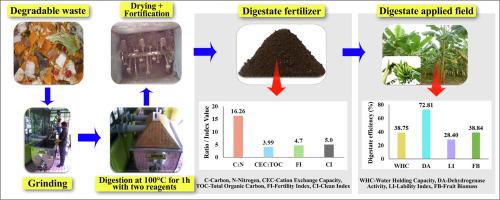Waste Management ( IF 8.1 ) Pub Date : 2021-01-28 , DOI: 10.1016/j.wasman.2021.01.002 Naveen Leno , Cheruvelil Rajamma Sudharmaidevi , Gangadharan Byju , Kizhakke Covilakom Manorama Thampatti , Priya Usha Krishnaprasad , Geethu Jacob , Pratheesh Pradeep Gopinath

|
Thermochemical digestion is a rapid technology of biowaste management resulting in the instant production of organic fertilizer. Characterization and assessment of its suitability as an organic fertilizer is essential for recommendation for crop application. Biowaste and the thermochemical digestate were subjected to physicochemical and biochemical characterization and the compost maturity parameters assessed. The product integrated with inorganic fertilizers was tested in an Ultisol grown with banana in comparison with farmyard manure based fertilizers. Temporal variation in soil reaction, water holding capacity, carbon dynamics, dehydrogenase activity and plant biomass were determined. The thermochemical digestate fertilizer had a bulk density (0.76 Mg m−3), pH (neutral), C:N ratio (16.26), CEC (85.70 cmol(+) kg−1), CEC/ TOC ratio (3.99), Fertilizing index (4.7) and a Clean index (5.0). Field evaluation revealed enhanced water holding capacity (38.75–83.17%). Total carbon increased with consistently high labile (R2 = 0.9551) and non labile carbon fractions and the lowest average lability index (0.78). Dehydrogenase activity at harvest enhanced by 72.81%. An even biomass allocation resulted in 38.84% more biomass production in the fruit over farmyard manure based treatments. In addition to ensuring the safety of the environmental ecosystem, the thermochemical digestate conformed to be a quality resource favoring microbial proliferation and carbon sequestration, thereby restraining carbon dioxide emission. The thermochemical digestate fertilizer based nutrition serves the key deliverables of natural resource management, ecofriendly rapid disposal of biowaste and quality organic fertilizer for banana in Ultisols.
中文翻译:

固体废物中的热化学消化肥料:香蕉的特性,不稳定的碳动力学,脱氢酶活性,持水量和生物量分配
热化学消化是一种快速处理生物废物的技术,可立即生产有机肥料。表征和评估其作为有机肥料的适用性对于推荐作物应用至关重要。对生物废物和热化学消化物进行物理化学和生物化学表征,并评估堆肥成熟度参数。与农家肥料基肥料相比,在与香蕉一起种植的Ultisol中测试了与无机肥料结合的产品。测定了土壤反应,持水量,碳动力学,脱氢酶活性和植物生物量的时间变化。热化学消化肥料的堆密度(0.76 Mg m -3),pH(中性),C:N比(16.26),CEC(85.70 cmol)(+) kg -1),CEC / TOC比(3.99),施肥指数(4.7)和清洁指数(5.0)。现场评估表明,保水能力提高了(38.75-83.17%)。总碳增加,并且不稳定程度始终很高(R 2 = 0.9551)和非活性碳分数和最低平均不稳定性指数(0.78)。收获时的脱氢酶活性提高了72.81%。均匀的生物量分配使水果的生物量产量比农家粪便处理高38.84%。除了确保环境生态系统的安全外,热化学消化物还被认为是有利于微生物繁殖和固碳的优质资源,从而抑制了二氧化碳的排放。以热化学消化肥料为基础的营养是自然资源管理,生态友好型生物废料的快速处理以及Ultisols中香蕉的优质有机肥料的关键交付物。

























 京公网安备 11010802027423号
京公网安备 11010802027423号